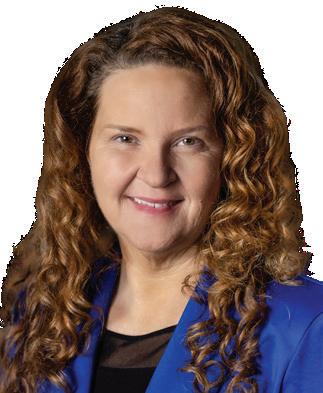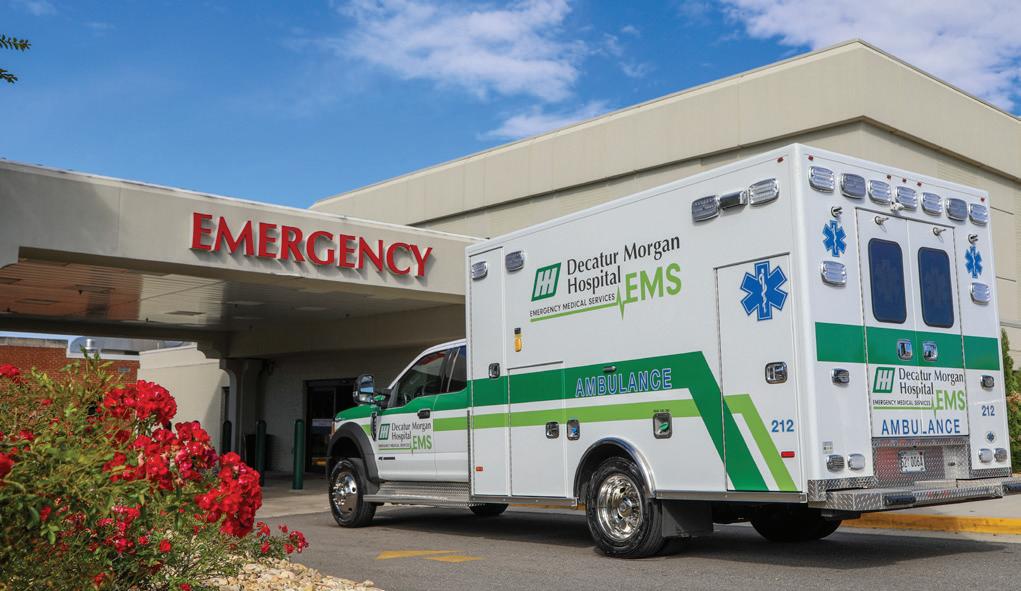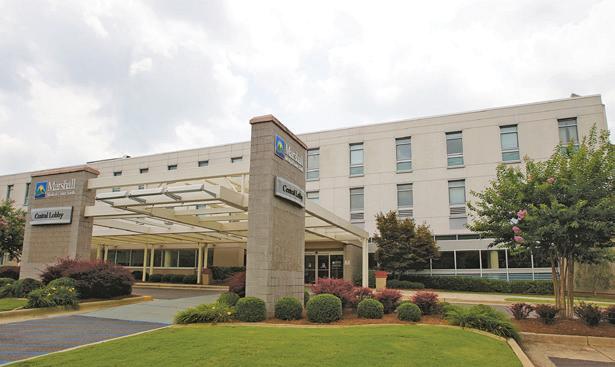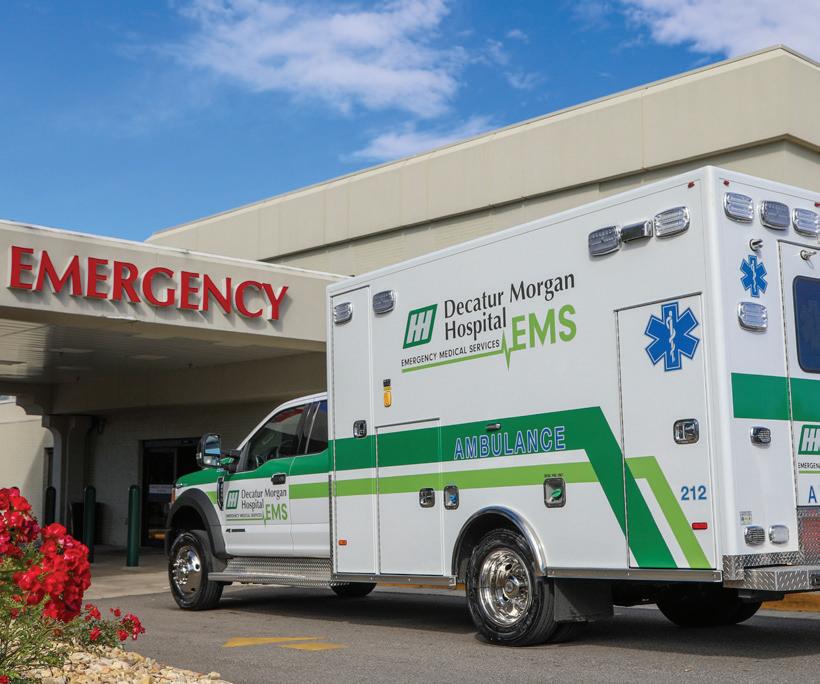






















Huntsville Hospital Health System’s 2023 Report to our Communities can be summed up in one word…TOGETHER. From Red Bay to Decatur to Scottsboro, all across the region, including into Tennessee, our Health System hospitals are responding together to the meet the challenges of serving our communities.
With this in mind, we developed a comprehensive Strategic Plan for 2022-27. Our plan clarifies our mission, vision and values; and reinforces our commitment to our communities. The plan is organized along five major areas which encompass the challenges ahead of us:
• Ensuring excellence in quality and outcomes
• Improving access and convenience
• Aligning with physicians and providers
• Developing our workforce
• Enhancing system integration
As we address these challenges, we will not lose sight of our mission to provide high quality care and coordinated services that improve the health of our communities. We exist for the purpose of serving our patients while filling the gap as the health care safety nets for our respective communities.
In this report you will find a review of the past year, as well as a report on the efforts we made to provide quality, safe care to our patients. We are proud of the hard work that is done by our 18,000 employees and we thank them for their dedication.
We thank you for choosing Huntsville Hospital Health System for your care and for supporting your local hospital. Working together, we are making a difference in the lives of hundreds of thousands of people across the region.
Samz Chief Executive Officer Philip W. Bentley, Jr. Chairman, Health Care Authority
Philip W. Bentley, Jr. Chairman, Health Care Authority


 Jeff
Jeff Samz
Philip W. Bentley, Jr.
Jeff
Jeff Samz
Philip W. Bentley, Jr.
1.
Decatur
Decatur
Map includes hospitals owned, managed or a liated facilities.
Obligated Entities
Huntsville Hospital
Huntsville Hospital for Women & Children
Madison Hospital
Huntsville Hospital Foundation
Caring for Life (Hospice Family Care)
Athens-Limestone Hospital
Decatur Morgan Hospital
-Decatur campus
-Parkway campus
-Decatur West
Helen Keller Hospital
Highlands Medical Center
-Cumberland Health & Rehab
-Highlands Health & Rehab
Lincoln Health System
-Donalson Care Center
Marshall Medical Centers
-North and South
Red Bay Hospital
4 responding to the challenge together
Other Ownership Relationships
Continuum RX (Home Infusion)
North Alabama Community Care
The Surgery Center of Huntsville
Alliance Cancer Care
North Alabama Managed Care Inc.
CompOne
Health Group of Alabama (HGA)
-Occupational Health Group
-Laundry
-Medicaid Maternity Care
-Home Medical Equipment
LHC Home Care
Affiliate Relationships
St. Jude Hospital Affiliate Clinic
Emergency Medical Services
City of Decatur
Colbert County
Franklin County
Limestone County
Lincoln County, TN
Jackson County
Marshall County Partnership
Viva Medicare
October
GILES FRANKLIN LINCOLN LAWRENCE BLOUNT LAUDERDALE DeKALB CHEROKEE ETOWAH WINSTON CULLMAN JACKSON FRANKLIN MADISON
Frank Caprio
Amit Arora, M.D.
Jim Bolte
Kerry Fehrenbach
Tharon Honeycutt
Janice Johnson
Macon Phillips, M.D.
Beth B. Richardson
Roy Rollings
To provide high quality care and coordinated services that improve the health of our communities
To be the choice for care and careers in the communities we serve
Safety, Compassion, Integrity, Excellence, Innovation, Accountability, Diversity, Equity, and Inclusion

108,161
*For the fiscal year ending June 30, 2022
Huntsville Hospital Health System serves as the health care safety net for communities throughout the Tennessee Valley. Caring for all patients, regardless of their ability to pay, is part of the mission of community-owned hospitals. Charity care for children and infants, as well as adults, is rendered every day in our facilities. In fiscal 2022, the Health System provided $132,654,409 in uncompensated care. The value of this care is calculated on the actual cost of providing the care, not on the charges.
responding to the challenge together
With the worst of the COVID-19 pandemic now thankfully passed, hospitals across the nation, and in Alabama, are left with challenges that could linger much longer than the virus. Some of these challenges are unprecedented, and others were expected. In both cases, the delivery of quality healthcare is impacted by how hospitals respond in the new and changed environment.
Huntsville Hospital Health System is taking a collaborative approach that is built on the strength of our local facilities. As like-minded, community-focused hospitals, we are clearly stronger when we work together. In 2022, we finalized a Strategic Plan with this in mind. We must remain aligned and intentional in our efforts to address these issues.
Our plan for the post-pandemic era focuses on major areas of our relationship with our patients and our healthcare team. Underlying our efforts is the need to remain financially
viable so that we can fulfill our mission as the healthcare safety net for north Alabama and southern Tennessee. Our strategic priorities include workforce development; ensuring excellence in quality, safety and outcomes; improving access and convenience; aligning with our physicians and providers; and enhancing system integration.
Staffing shortages continue to plague all hospitals. We are a “people business” and our top priority is recruiting and retaining employees — especially nurses. The International Council of Nurses estimates a global shortage of 13 million nurses by 2030. Burnout plays a major role, especially following the pandemic, but an aging workforce is also a major factor. Our efforts to retain staff include more opportunities through professional development, recognition, and wellness support.
Here are some of the steps that we are taking to address workforce challenges in our hospitals:
1. Partnering with training programs, such as Drake State, UAH School of Nursing, and Calhoun Community College to help produce the nurses and other professionals that we need.
2. Training our own workforce has long been a priority. Huntsville Hospital operates several schools to help build our own team: School of Radiologic Technology, Pharmacy Technician, Surgical Technology, Perioperative Nursing, and Patient Care Aide training. All of these programs offer excellent career opportunities in our Health System and beyond.
3. Telling our story all over the southeast. Huntsville is the #1 place to live in America, according to multiple sources. Huntsville Hospital Health System is one of the Best Employers in Alabama, according to Forbes Magazine. Opportunities abound here.
Nothing is more important in healthcare than consistently delivering excellence in the services that we provide. Excellence in healthcare is built on safety and quality that is intentional, measureable, and focused on positive outcomes. We are committed to improving safety at all of our hospitals and we want our performance reflected in the major publicly available rating systems.
Every employee in our Health System is being trained in a high reliability program to standardize behaviors for safe care to our patients. “Cross check” and “repeat back” are
some of the familiar techniques that we have adopted from other highly reliable industries. Our intent is to Be Safe. Be Caring. Be Kind.
No doubt, if we are to provide an excellent patient experience in our facilities, we must be transparent on how we are doing. Included in this publication is a quality report that provides hospital-specific data on how we are performing in key clinical measurements.
Access and convenience are important factors in consumer selection today, including in healthcare. Huntsville Hospital Health System is committed to offering appropriate and accessible services in the communities that we serve. We employ more than 600 primary and specialty care physicians, physician assistants, and certified registered nurse practitioners throughout the region. Our Urgent Care clinics also provide a convenient option for thousands of patients in the area.
While locations are important to consumers, so is the ease of use in digital services. We are working hard to improve online capabilities, such as telemedicine, enhanced registration, scheduling and payment methods. Connecting our hospitals through common information systems will enable more timely and efficient transfers and will allow patients to stay close to home for care as much as possible.
More than 2,000 physicians and other providers serve the patients in our hospitals. Aligning with them is essential to the fulfillment of our mission. Our communities are best served through a well-coordinated approach to bring more advanced services and medical specialties to our communities.
The members of our hospital medical staffs serve as the captains of the healthcare team in our facilities. Bringing the necessary care to areas of low access is critical as we integrate our efforts to improve health. Working together, we are focused on providing better care throughout the various patient care settings in our system.
Across the board, our goal is to use the strength and size of our organization to provide more and better services and experience for patients, physicians, and employees. Our desire is that your experience with us will be seamless and convenient with information technology systems that are connected. We are working hard to optimize our clinical workflows for improved quality and outcomes. System-wide we are taking intentional steps to improve emergency and transportation services in our communities.
Through collaborative efforts and with consistent processes, our hospitals can address common challenges, and ones that are unique to each market.
While these major focuses take center stage in our strategic plan, our Health System will not lose sight of the need to advance health equity throughout the communities that we serve. Our hospitals exist to serve all residents. Our Better Together initiative reinforces our commitment to diversity, equity and inclusion.
A hallmark of Huntsville Hospital has always been the availability of the latest medical technologies and methods. Technology and equipment is very expensive, and even more so in the inflationary period we face today. We remain committed to offering the most advanced capabilities in diagnostic, medical and surgical treatment.
Huntsville Hospital Health System is everywhere you need us throughout north Alabama and southern Tennessee. We are proud of our heritage as a community-owned, not-for-profit health system and we have maintained a rich history of service while providing the most advanced health care available between Birmingham and Nashville. Established in 1895, Huntsville Hospital is the second largest hospital in Alabama and the flagship of the Health System. Today, our system provides tertiary care for more than a million residents in the region.
Among the advanced services which are provided in the Health System are:
• Level I Trauma and Emergency services
• Comprehensive Cardiothoracic Care, led by the Heart Center
• Major surgical services, including neurosurgery
• North Alabama Neuro Stroke Network

• Orthopedic care in a dedicated facility
• Full oncology services
• Pediatric services: Pediatric ER, nursing unit, Pediatric ICU, and Kids Care transport
• Advanced maternity services: high risk antepartum unit, Obstetrical Emergency Department and the Regional Neonatal Intensive Care unit
• Advanced outpatient and imaging services

• Physician network of primary care and specialty providers throughout the region
• Post-acute care facilities, including inpatient hospice unit
10 responding to the challenge together
Tracy Doughty President and Chief Operating OfficerAdmissions
41,513 ER Visits
77,021 Surgeries
36,861
Outpatients
354,657




Traci Collins President

Hospital Board
Kyle Bridgeforth Vice Chairman
Russ Mitchell
John Curtis
Pat King
Paul Fry, M.D.
Patrick Boyett, D.O.
Crystal Walker, M.D.
Jim Moffatt
William C. Ming, Jr
Bethany Shockney
Tom Norton
Sheila Smith
Tony McCormack
Joseph A. Cannon
Pauline A. LettAnderson, MD


David Breland Chairman
Melissa Craig
Philip W. Bentley, Jr.
Scott Matthews, M.D.

Ken Schuppert
Claude Wally Terry
Crystal Brown
Punura J. Reddy, M.D.





MEDICAL CENTER Lincoln


Mary Beth Seals President

Hospital Board

Chris Rush President
Russ Spray
Anthony Taylor
Jacky Atchley
John Thorpe
David Sanders
Donnie Ogle
Bill Edwards, M.D.

Theresa Morrison, M.D.
Brian Carter
Elaine Middleton
Laura Monks
Charles Kidd, M.D.
Pat Marsh
Gwen Shelton
responding to the challenge together
Allen
Liles Burke
Stan Chaffin
Wayne Crews
David Walker
Mike Alred
Andrea Elrod
Jenna Boyd Carpenter, M.D.
Winter Wilson, M.D.
Tim McRae
Hospital Board Admissions 1,068 ER Visits 15,482 Surgeries 586 Births 232 Outpatients 39,968
Jeff Samz
Providing quality, locally-delivered healthcare services to patients in our communities is inherent in the mission of Huntsville Hospital Health System. On occasion, however, more advanced, specialty care may be required. Our Health System is prepared with a variety of subspecialties and facilities for those occasions.
Decatur Morgan Hospital West is north Alabama’s only behavioral health hospital, offering 64 licensed beds for inpatient and outpatient psychiatric programs primarily for children and adolescents.



Huntsville Hospital’s Heart Center is the most experienced cardiovascular program in the region. With more than 70 board-certified cardiologists, cardiothoracic surgeons, cardiac anesthesiologists, and other advanced cardiac practitioners, the Heart Center and Huntsville Hospital’s cardiac services team work together to deliver quality heart care using the latest technologies and techniques.
Located on the campus of Redstone Village, Huntsville Hospital’s Hospice Family Care inpatient facility provides special care for patients who are nearing the end of life. The beautiful facility includes 15 private rooms in a home-like setting.

For patients needing skilled nursing and rehabilitation care, Huntsville Hospital Health System provides three facilities — Highlands Health & Rehab in Scottsboro, Cumberland Health & Rehab in Bridgeport, and Donalson Care Center in Fayetteville, TN.
The Marshall Cancer Care Center, a joint effort of Marshall Medical Centers and UAB, offers the latest oncology treatments — both radiation and medical oncology — for area residents.
There are only three Level One trauma centers in Alabama and one of them is at Huntsville Hospital. Board-certified trauma and emergency physicians are available 24/7 along with other specialty surgeons, physicians, and highly trained nurses.


P atient safety is the highest priority in Huntsville Hospital Health System. As we continue our journey to being a highly reliable organization, we are committed to developing a culture that delivers safe care in every patient interaction. By incorporating best practices from health care and other highly reliable industries, we believe that we are taking the right steps in our efforts to provide the quality care that you seek when you are in our facilities. Our pledge remains to Be Safe, Be Caring, Be Kind. The measures below reflect the progress and the challenges that we are making in this journey.
Patient Safety Indicators (PSIs) are a set of measures that provide information on potential hospital complications and adverse events following procedures. The measure shown to the right includes the following PSIs: decubitus ulcer, iatrogenic pneumothorax, postoperative hip fracture, perioperative hemorrhage or hematoma, postoperative acute kidney injury, postoperative respiratory failure rate, perioperative pulmonary embolism or deep vein thrombosis, postoperative sepsis, postoperative wound dehiscence and accidental puncture or laceration. This index value is a ratio of observed to expected events. The goal is to remain below a score of 1.0.
Data source: Hospital Compare www.medicare.gov/hospitalcompare
HCAHPS (Hospital Consumer Assessment of Healthcare Providers and Systems) is a national survey instrument and data collection methodology for measuring patients’ perceptions of their hospital experience. The survey is conducted on behalf of CMS, which oversees Medicare and Medicaid. The “Willingness to Recommend” question measures the percentage of patients who answered “always.”
Data source: Hospital Compare www.medicare.gov/hospitalcompare
CHART KEY
HH - Huntsville Hospital
MH - Madison Hospital
DMH - Decatur Morgan Hospital
ALH - Athens-Limestone Hospital
HKH - Helen Keller Hospital
MMC - Marshall Medical Centers
HMC - Highlands Medical Center
LMC - Lincoln Medical Center
responding to the challenge together
*Huntsville Hospital data includes Huntsville Hospital and Huntsville Hospital for Women & Children. Decatur Morgan data includes Decatur and Parkway campuses. Helen Keller data does not include Red Bay Hospital.
30-day mortality rates are the percent of patients who expire within 30 days of being hospitalized. Mortality rates are considered an “outcome of care” measure and show what happened after patients with certain conditions receive care. The rates are “riskadjusted,” meaning the calculations take into consideration the patients’ severity of illness upon admission.
Data source: Hospital Compare www.medicare.gov/hospitalcompare
Inpatient Medicare Only | July 2018 - June 2021
Acute Myocardial Infarction (Heart Attack) National Average 12.4%
Heart Failure National Average 11.3%
Pneumonia National Average 16.6%
Inpatient Medicare only
July 2018 - June 2021 (Heart Failure)
July 2020 - June 2021 (Hospital-wide)
Hospital-Acquired infections (HAIs) are infections people get while receiving health care for another condition. HAIs can happen in any health care facility, including hospitals, ambulatory surgical centers, end-stage renal disease facilities, and long-term care facilities. HAIs can be caused by bacteria, fungi, viruses, or other, less common pathogens.
Data source: Hospital Compare www.medicare.gov/hospitalcompare
30-day readmission rates are the percent of hospitalized patients who return to the hospital within 30 days of discharge. While some readmissions are appropriate, the measure is intended to highlight readmissions to the hospital that were potentially avoidable. The rates are “risk-adjusted,” meaning the calculations take into consideration the patients’ severity of illness upon admission.
Data source: Hospital Compare www.medicare.gov/hospitalcompare
Heart Failure National Average 21.3%
Hospital Wide National Average 15.0%
Hospital-Acquired Infections
July 2021 – June 2022
CLABSI (Central Line-Associated Bloodstream Infection) National Average 0.97
CAUTI (Catheter-Associated Urinary Tract Infection) National Average 0.76
MRSA (Methicillin-Resistant Staphylococcus Aureus) National Average 1.06 C. diff (Clostridium difficile) National Average 0.49
Ratio of the actual observed rate to the predicted rate.
















